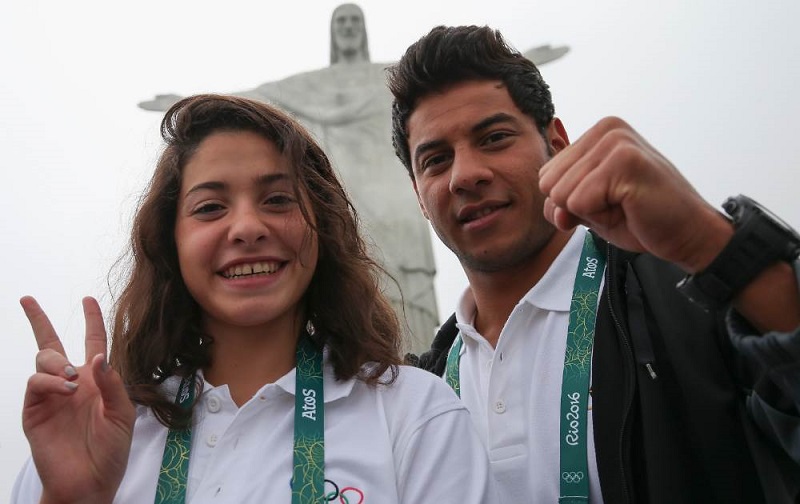They are marathoners, judokas, orphans, lost, stateless. They are described as “displaced,” their countries of origin “war-torn,” full of “horrors” and “heartbreak.”
Speaking to the international press at a news conference Saturday (30 July) swimmer Rami Anis, who fled Syria with a small suitcase, offered a new phrase for the world to consider. “The refugee Olympic team is a team that does not know despair,” he said.
He was joined on the dais by fellow Syrian refugee and swimmer Yusra Mardini, who is sponsored by Germany, as well as judokas Popole Misenga and Yolande Mabika who previously competed for the Democratic Republic of Congo but together sought asylum in Brazil during the 2013 world cup hosted in Rio de Janeiro.
Kenyan peace activist and Olympian marathoner Tegla Loroupe, the delegation’s chef de mission, gave a powerful statement about the role of sport.
“To realize that somebody with the status of refugee is also a human,” she said. “Though their country was broken, their sprit of humanity [and] their sprit of athleticism was not.”
‘Do not despair’
Asked to sum up with one word the experience of competing under the neutral flag of the International Olympic Committee, Anis eloquently made his point in a few sentences, speaking in Arabic through a translator.
“We have iron wills and we feel really sad because of the wars in our country but this does not kill our spirit. I always used to say to myself, do not despair. Do not give up and you will get there,” said Anis, who could have been referring to the journey he made through Turkey and Greece before reaching Belgium, where he was granted asylum in 2015 and continues to train with Olympic champion Carine Verbauwen.
The 25-year-old butterfly specialist who idolizes U.S. Olympic champion Michael Phelps will swim in the men’s 100m fly. The heats run 11 August with the final set for 12 August at Olympic Aquatics Stadium.
Fellow Syrian refugee, Yusra Mardini, said she was swimming for refugees the world over as well as Germany, where she now lives and trains in Berlin with Wasserfreunde Spandau 04, a club she thanked during the press conference.
Mardini, at 18, will compete in the women’s 100m freestyle and butterfly, takes a sweet, diplomatic approach towards questions, wears colourful nail polish, and is often smiling when she speaks of the honour she feels to compete at Rio 2016.
“We are representing now the biggest flag, which is all the countries,” she said.
‘Fight for life’
Popole Misenga and Yolande Mabika both addressed the press in Portuguese, an adoptive language for both Congolese refugees who also speak French.
“I answer with my Portuguese because Brazil is now my home,” said Mabika, 28, who lived a precarious life sleeping on Rio’s streets but she said never forgot the strength and discipline she learned from the sport she first picked up while living in a Kinshasa orphanage.
“In my mind, I was only training to keep my own strength. I knew it wasn’t good to be idle. Then somebody came to me and said, ‘Tomorrow you will go out and train because you will train for the Games.’
“The day my name came out as an Olympian, I was crying for joy. This team is my family now, we’re all here together and I have them in my heart,” she said, her smile beaming before she took to a more serious message.
“I still have some memories. When I remember things, I become sad. I haven’t seen my family for 18 years, this is sad. When you ask questions, sometimes I get sad. But now we are here together and we are trying to be focussed. Together we will tell an unprecedented story.
“This is not just a struggle for sport, it is a struggle for life. God will help me and I am here to make history. I am going to fight for my life.”
Four-time Brazil Olympian and long-time judo coach Geraldo Bernardes has taken the two refugees under his wing, as he has with countless children and teens from Rio’s favelas, most notable among them 2013 world champion Rafaela Silva who grew up in the notorious City of God.
‘I am alive and well’
Misenga, 24, moved members of the press to tears and then drew a round of applause after he became emotional speaking about the brothers he has not seen in years.
“I don’t know how they look anymore because we were separated. I don’t remember their faces,” he said, pausing to wipe his eyes.
He offered this message to his family, in the case they see him on television at the Olympic Games: “You can see your brother is alive and well. I’m striving so I can manage to one day buy a ticket for you to come to Brazil and live with me here. I send my hugs and kisses to wherever my brothers may be.”
Mabika competes in the women’s judo 78kg class beginning 11 August at Carioca Arena while Misenga competes in the men’s judo 90kg class beginning 10 August.
Taken from https://www.rio2016.com/en/
 Escambray ENGLISH EDITION
Escambray ENGLISH EDITION






Escambray reserves the right to publish comments.